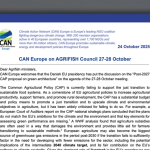MEDIA ADVISORY
What is happening?
On 27 May, Heads of the EU institutions will virtually meet with the recently onboarded Prime Minister of Japan, Yoshihide Suga, as their first comprehensive encounter, following up to the May 2020 leaders’ videoconference meeting.
This high-level meeting needs to be seen in the context of recent dynamic developments to further enhance global climate ambition (Petersberg Dialogue, EU-India summit, US Climate Summit, UK Climate and Development meeting) and with a view to the upcoming G7 Summit on 11-13 June and COP26 in November as further key milestones. As overall countries’ combined emissions reduction ambition still lags behind what is needed to set the world on a pathway to keep the Paris Agreement’s 1.5°C limit within reach, the EU-Japan meeting is another crucial opportunity to step up climate diplomacy and action, and deepen cooperation with Japan.
At the Leader’s Climate Summit hosted by the US administration, Japan announced its intention to cut emissions 46-50% below 2013 levels by 2030, with efforts toward achieving a 50% reduction. While this would be a significant acceleration from its existing 26% reduction goal, it would still be insufficient with regard to Japan’s fair share in 1.5°C pathways.
In December 2020, the EU submitted its Nationally Determined Contribution (NDC) under the Paris Agreement with the goal of reducing emissions by “at least 55%” by 2030 compared to 1990, but which CAN Europe regards as insufficiently ambitious to be in line with the goals of the Paris Agreement. The Paris Agreement goals should also guide both partners’ application of the Strategic Partnership Agreement (SPA) and the Economic Partnership Agreement (EPA). A report launched on 18 May by the International Energy Agency (IEA) finds that no new expansion of or investment in oil, gas, or coal beyond what is already committed should take place if the 1.5°C limit is to be kept.
At the EU-Japan Summit, both Parties are expected to announce a “EU-Japan Green Alliance”, which will likely focus on cooperation objectives towards achieving climate neutrality by 2050 and towards the strengthening the multilateral approach in confronting major challenges such as the climate crisis and biodiversity loss, which would contribute to the implementation of the external dimension of the European Green Deal.
What do CAN Europe and CAN Japan ask for?
Agreements coming out of the EU-Japan Summit should reflect and lead to:
-
A commitment to 1.5°C compatible climate action with significantly ramped up emission reductions needed by 2030, and not only by 2050.
-
Concrete cooperation to rapidly expand renewables and phase down the use of fossil fuels, including coal phase out by 2030 at the latest.
-
New climate finance announcements in support of developing countries, with a significant further increase required from both parties in particular with regard to grant-based finance for climate adaptation and addressing loss and damage.
-
Clear steps to phasing out fossil fuel subsidies and stopping any public financial support to the expansion of coal, oil and fossil gas use in other countries, and supporting respective G7 commitments.
-
The Paris Agreement goals should also guide both partners’ application of the Strategic Partnership Agreement (SPA) and the Economic Partnership Agreement (EPA).
“A new EU-Japan Green Alliance could be a key tool here if climate was to be taken seriously. Ahead of the G7 summit, it will be crucial that both partners pave the way for announcements to rapidly reduce climate harmful emissions from fossil fuels and to increase grant-based financial support for climate adaptation in developing countries affected by the climate crisis.” – Sven Harmeling, International Climate Policy Coordinator, Climate Action Network (CAN) Europe.
“Strong leadership by the EU and Japan toward decarbonisation is crucial. Building on the agreement of the G7 Climate and Environment Ministers’ meeting, both partners should take a lead in reaching an ambitious agreement to end coal and all support to fossil fuels, and accelerate transition toward clean energy at the EU-Japan summit.” – Kimiko Hirata, Representative, Climate Action Network (CAN) Japan.
–ENDS–
Contacts:
Nina Tramullas, Communication Coordinator at CAN Europe. +34 601 348 343; nina@caneurope.org
Sven Harmeling, International Climate Policy Coordinator at CAN Europe. +49 1776136431; sven@caneurope.org
Kimiko Hirata, Representative at CAN Japan, +81 90 8430 7453; khirata@kikoent.org



